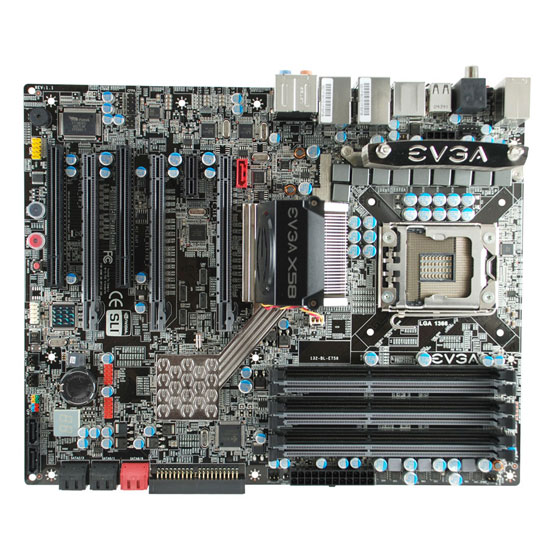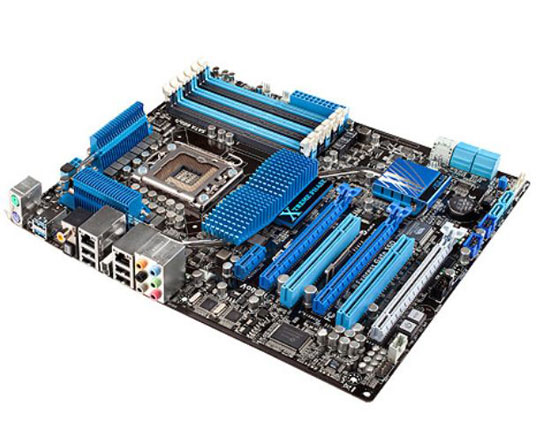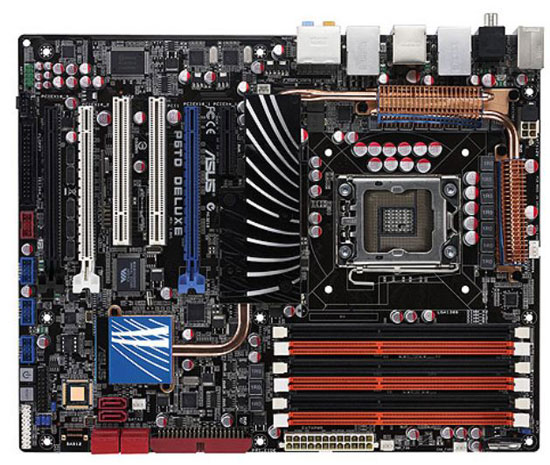Loyd's New Year - A Trio of Problem Systems
by Loyd Case on January 13, 2010 12:00 AM EST- Posted in
- Systems
The Slowly Dying Motherboard
My production system runs a Core i7 965 and 12GB of OCZ DDR3-1600 memory. The 965 clocks at 3.33GHz, and the memory runs at 1333MHz. In either case, it’s not really much of an overclock. The X58 chipset and Core i7 socket 1366 CPUs are rated at DDR3-1066 speeds officially. So technically, the memory is being overclocked.
The system was based on an eVGA X58 SLI motherboard – one of the early versions that shipped. I’d updated the BIOS as new versions came out.

Recently, I’d been having a weird series of glitches. My USB ports would stop working. Once every couple of days, I’d lose network connectivity. My audio would mysteriously stop working, even though I’d see audio activity in any media player, and the speakers seemed to be behaving correctly.
If finally occurred to me that maybe my I/O controller hub was slowly failing, or had developed an intermittent hiccup that created these seemingly unrelated issues.
So I decided to upgrade my motherboard.
My general philosophy when it comes to building the systems I actually use for productive work and personal gaming is to be somewhat conservative – if I can. Go with solutions that seem reliable and robust. I’d waited to upgrade my own system to Core i7 until I’d tested a slew of X58 boards, and the eVGA board had seemed stable. In fact, it had been running problem-free for months.
So naturally I ignored my own inclinations and bought a brand spanking new Asus P6X58D, which sported a discrete NEC USB 3.0 controller and a Marvell SATA 6gbps disc controller.

The board arrived, and seemed to install normally. Windows enumerated all the devices properly, and rebooted as expected. I installed the new drivers from the Asus DVD and rebooted.
Then a new symptom developed: after a warm boot, the fan on the Radeon HD 5870 would spin up to maximum speed and stay there. The sound was almost deafening. When this would occur, the system wouldn’t POST. Only shutting down the power supply and waiting a couple of minutes would allow for a normal boot.
Whiskey. Tango. Foxtrot.
After trying a variety of things – different CPUs, swapping in different memory, upgrading the BIOS (from 0201 to 0402) and even swapping in a different AMD graphics card, nothing changed. So I gave up. I headed out to my local friendly white box shop (Central Computer in San Jose), I picked up another Asus board: a P6TD Deluxe. The P6TD is a second (third?) generation X58 board from Asus, with more copper and 16-phase power. It’s really a souped up P6T board, but refined over the original design.

Swapped back in my original components, fired up the system and held my breath.
The system POSTed normally. Since then, I’ve run a number of applications, including some fairly system intensive games, and it’s all behaving as it should.
Lesson learned: when you need a working system for, well, work, then don’t go with the bleeding edge. I knew that already, but every now and then, I have to re-learn it. I suppose it’s my eternally optimistic nature, but I tend to believe that newer is often better. Alas, it’s not always the case.










109 Comments
View All Comments
michal1980 - Wednesday, January 13, 2010 - link
No, the problem was crap his daugther installed.Linux is not the answer. I run a q6600 at home with a slower video card, with vista since vista RC1. Its never been what I would consider slow.
You linux FanBozzzz, need to get off the stupity that the solution to every problem is linux.
PC doesn't boot. Get linux
PC Slow . Get linux
Viruis. Linux
UGly. Linux
etc, etc, Linux
Peroxyde - Wednesday, January 13, 2010 - link
I know Windows better than Linux. At work I use Windows and I have experience with all versions of Windows. The reason I got into Linux was because I wanted to know enough about Linux to check out the myths.My experience with Linux is similar to what petersterncan described in the post below. To you I would say, give Linux an honest try. By honest, I mean willing to learn and make an effort to overcome a technical problem. After that, you will may be revise your opinion.
I seem to be a Linux Fanboy, actually I consider myself as a beginner. Lots of things I still need to go to forum to get help. However I know enough to recognize that Linux has some strengths that Windows doesn't. After weighting pros & cons, Linux is a better choice for my home usage. Also to backup Peter statement, have a serious look about Virtual Machines. Virtualbox in particular. This solves a lots of problems whenever I need a native Windows environment, actually I use it a lots.
Ugly Linux? This is also a myth. I have played with enough desktop effects, they are fun at the beginning but becomes either annoying or useless in the long run. Just trust me on that, it is possible to make Linux desktop look very nice. But not everybody is interested by eye0candy effects.
michal1980 - Wednesday, January 13, 2010 - link
I was joking.Not that linux was ugly.
but that if the PC looked ugly, installing Linux will fix it.
Look at the target audience. A 16year old highschool female. And the anandtech nerds think LINUX is the answer? WTF. Why?
I know the reason why, its because the linux fanboism is strong here. The same line of reasoning as to why you shouldn't throw hardware at the problem, should be used at software.
Theres no need to throw out XP, or Vista, Or Win7 because the underlining windows install is bunk at this point.
The first step to the problem with this box is to format the drive an reinstall the OS. Odds are the freshly installed OS will run much faster then XP busted, no matter weather or not it was a flavor of Windows, or a Flavor of Linux.
Personally, I use linux. I dont have the time, nor want to 'learn' another OS. For me windows works.
pkoi - Wednesday, January 13, 2010 - link
I'm am so overwhelmed by everything in Winworld alone, There must me some 30 new apps everyday and after 15 years you get to know and use some 300+ software, I would really like understanding more of linux, but I don't see the day I'll be done understanding the inner parts of Windows. I fear It would be a 6 month adaptation, that would not benefit that much for me.I must agree that most slowdowns are because of software problems, I think he should have cleaned the reg or monitored process then added 2gig at last.
petersterncan - Wednesday, January 13, 2010 - link
I recently made the switch to Ubuntu Linux 9.10 64-bit.I'm not a fanboy for Linux... but I do know some of the practical advantages... such as not being a huge target for viruses and malware the way Windows is.
But anyway... after my switch... for software problems, I can say with confidence that Linux Can be the answer for 100% of all the Windows software problems.
What ever doesn't run under Linux natively, you can run within a Virtual Machine under Linux using a package such as VirtualBox. Could can also use other apps such as Wine.
Note that prior to my switch, I was running Windows 2000 Professional... I wanted to switch to 64 bit for longevity and performance and I wanted to get off an OS that was about to have support discontinued.
But my concern was being able to run anything... even Windows Apps. When I learned about the VirtualBox application... I know I can practically run anything... or at least any OS that runs on x86.
For it to work well, all you need is sufficient memory, disk space and processor... in my case... a newly purchased Athlon II x4 630 with 4GB ram and a 2TB HD...
Windows 2000 works faster now on the new hardware within a virtual machine than on my old hardware (single core Athlon, 320GB hd, 512mb ram)
And the nice thing about having Windows within a virtual machine... you make one base image and work off a copy. Screw up that copy? No prob... delete it and copy the base set up again. Concern about data loss? No worries there either... you just copy the data to the part of the disk that is not part of the virtual machine.
Plus Linux boots up and shuts down faster than any Windows PC I've ever used...
The hardest part of my setup? Getting my netgear Wireless N PCI adaptor working... which was resolved by downloading some closed-source Broadcom drivers.
Note as well that I did a clean install to a new hard disk to minimize any chances of headaches.
I find "upgrading" an OS only saves you time in the short run... in the long run, you end up having to do a clean install anyway.
So yes... I've concluded all Windows software problems CAN be fixed by switching to Linux. All it takes is a bit of research and self-education.
Now if the hardware isn't up to snuff... that's another story...
nubie - Wednesday, January 13, 2010 - link
I'm afraid custom drivers for obscure hardware (6 axis 3D controllers anyone?) won't run in that sort of environment, neither drivers for video cards (with stereoscopic or TV-Out support for instance.)It is an interesting solution, but until the virtual machines support installation of drivers for the OS in the machine it won't work.
May not be a concern for software people, but if I didn't need hardware support I probably would have moved to Linux a few years ago.
red1 - Wednesday, January 13, 2010 - link
NO no You don't have to install linux, just run a live-cd on it andgive it a try.
So then will see what's going on if the hardware is the problem or the xp ?
dswilloughby - Wednesday, January 13, 2010 - link
Been reading this site for years but this is the only article that has made me want to reply back, wierd. Anyhow, it's a great read, and reminds me about the real troubles of DIY PC people. Some stuff you encounter is just plain silly, and you usually broke your own rules doing it, but hey it happens to the best of us.....I have had sound cards that slowly turn down their volume all on their own, motherboards ressurect themselves after sitting in a box for a couple of years [ram in last slot only, fixed it] and CPU's that decide not to OC even by 1MHz, when you had them happily runnning 1GHz overclocks for years. I know I fiddle too much and cause most of these problems myself, but hey sometimes that's half the fun isn't it?
As for your 5870 problem, don't worry mine also does some real wonders on me, but so far I've found the newer drivers/bios are slowly fixing these issues so I beleive most of them are fixable errors and not it being a shoddy card. That's one thing us Aussies don't have the luxury of, RMA's. You do that over here and good luck if you see a replacement in 6 months time.....
nubie - Wednesday, January 13, 2010 - link
I think I can beat your story, how about a Cyrix MediaGX system that won't run over 233mhz when it is a 266mhz chip, and if you put the memory in the slot backward (and then return to the correct way) it will overclock well past 300mhz just fine.That one was very very strange. And I mean strange!
somedude1234 - Thursday, January 14, 2010 - link
Now you're bringing back some memories. Here's two that make me feel REALLY old:Story 1: I picked up a 486-DX4 100 MHz CPU (yeah baby!), motherboard to host it, and some new RAM to replace my aging 386 so I could kick some butt at DOOM2 over IPX. This was my first build that was entirely self-funded, all from a computer show at the local community college. In my eagerness to get it together quickly, I managed to put the CPU in without aligning the "pin 1" arrow on the motherboard with the "pin 1" arrow on the CPU. I assumed that if the CPU dropped in so easily, it MUST have been in correctly. When I plugged it in and nothing happened at first, I was a bit perplexed. Then I heard the POP! and saw smoke coming from my brand new CPU. Needless to say both the CPU and the mobo were toast.
Story 2: This one is a bit shorter, and much older. Anyone here remember the 5.25" Seagate 20 MB and 40 MB HDD's with the gold colored casing? If you do, then you remember that they were very expensive in their day, and you'll also remember that there was a resistor pack that had to be installed or not depending on whether the drive was master or slave on the controller. Well, I got it wrong one time, the drive did not survive. Dad was not happy =(